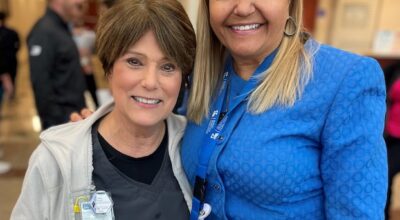$20 Million Federal Grant Will Boost Biomedical Science Collaborations Across Louisiana
Published 11:23 am Wednesday, August 17, 2022
|
Getting your Trinity Audio player ready...
|
Major Louisiana Research Institutions Will Focus on Combating Chronic Diseases, Recruiting Scientists, and Boosting Community Involvement
BATON ROUGE, Louisiana—The LA CaTS Network, which has built a statewide research infrastructure based on a collaborative partnership involving 11 major Louisiana academic, research and healthcare delivery institutions, has been selected by the National Institutes of Health to receive a $20 million, five-year grant to continue its work to make Louisiana healthier by addressing health disparities and improving health outcomes in the state’s underserved population with chronic diseases.
“The new $20 million award will bring total NIH grant support for the Louisiana Clinical and Translational Science (LA CaTS) Network to $60 million over a 15-year period. The additional $20 million will enable the LA CaTS partner institutions across Louisiana to continue their collaborative work, with the long-term goal of building a healthier Louisiana,” said John Kirwan, Ph.D.
Dr. Kirwan is Pennington Biomedical Research Center’s Executive Director and the NIH grant Principal Investigator. Program Co-Directors are Steve Nelson, M.D., Interim Chancellor of the LSU Health Sciences Center New Orleans, and Lee Hamm, M.D., Dean of the Tulane University School of Medicine. In addition to directly funding biomedical research, the NIH grant will also help boost the number of scientists in Louisiana who conduct biomedical research as well as facilitate a grassroots effort to increase community input and involvement in clinical and translational research studies, Dr. Kirwan noted.
Both Drs. Hamm and Nelson concur that Louisiana residents are benefiting from the work of the LA CaTS Network, as well as Louisiana biomedical researchers. “The LA CaTS Network collaborations are enabling us to better address the needs of our state’s most vulnerable residents at the same time they are improving public understanding of the need for support of clinical research,” Dr. Nelson said. “These collaborations through the LA CaTS Network have been transformative for partner institutions and are speeding the development of clinical and translational research, and disseminating that research from laboratories into practical application,” according to Dr. Hamm.
Major accomplishments of the LA CaTS Network cited by Dr. Kirwan include helping to secure more than $210 million in external grant awards to fund disease-related research at partner institutions, with about $150 million of that amount in prestigious NIH awards.
He also noted success in expansion and engagement of new partners and resources, such as growth of the Biomedical Informatics (BMI) Core. This collaboration enables multiple institutions to access clinical data from across the state and has led to the creation of virtual study groups that include data from patients with breast cancer, diabetes, HIV, and COVID-19, now being used by LA CaTS Network researchers.
Highly engaged Community Advisory Boards (CABs) headquartered in the New Orleans, Baton Rouge and Shreveport/North Louisiana regions are pillars of the LA CaTS Network with its statewide service focus, according to Dr. Kirwan. “The CABs have fostered direct community participation on research teams which has contributed to developing and implementing studies. CAB members also serve as advisors to researchers on a broad range of study ideas including diabetes, cancer, obesity and COVID-19, as well as many other ongoing research efforts,” he said.
The LA CaTS Network’s focus on developing Louisiana’s biomedical research infrastructure has resulted in expanded access to technical services and resources that enhance research capabilities for over 850 clinical scientists at affiliated institutional partners.
Pennington Biomedical, LSU Health Sciences Center in New Orleans and Tulane Health Sciences Center together form the LA CaTS Network core. Joining the core trio as partners are Xavier University of Louisiana, LSU Health in Shreveport, Ochsner Health System, Children’s Hospital of New Orleans, Southeast Louisiana Veterans Health Care System, University Medical Center, LSU Health-New Orleans School of Dentistry, and LSU A&M, according to Dr. Kirwan.
“During the past decade,” Dr. Kirwan said, the LA CaTS Network transformed clinical and translational research in all parts of Louisiana. Instead of operating in isolation, our partner institutions are working together to address health disparities and improve health outcomes.”
“This collaborative approach has accelerated research aimed at reducing the burden of chronic disease and the health disparities in Louisiana.” Dr. Nelson said. “The success of LA CaTS underscores how when we work together across the state, we can achieve a great deal that benefits all of Louisiana.”
“Louisiana is among the states with the highest rates of death from chronic disease. The LA CaTS Network will continue to focus its research on obesity, heart disease, cancer, aging and dementia. This is crucial work, imperative to assure more of our residents live longer and healthier lives,” he said.
“The LA CaTS Network supports an unprecedented collaborative effort among our state’s academic institutions. I am fortunate to be aided by Drs. Nelson and Hamm,” Dr. Kirwan said.
For more information about this grant award, please visit lacats.org. Supported in part by U54GM104940 from the National Institute of General Medical Sciences of the National Institutes of Health, which funds the “Louisiana Clinical and Translational Sciences Network”.
The content is solely the responsibility of the authors and does not necessarily represent the official views of the National Institutes of Health.
Additional quotes:
William F. Tate IV, LSU President:
“Strengthening biomedical research represents a foundational pillar of LSU’s Scholarship First commitment. The LA CaTS Network’s research contributions align seamlessly with our broader research strategy, and this additional $20 million in NIH grant funding assures we can continue to improve Louisiana’s research infrastructure.”
Michael Fitts, President, Tulane University:
“Tulane’s research capacity in clinical and translational areas has increased dramatically in recent years. This latest award will continue the state’s efforts to further accelerate this momentum.” Tulane President Michael Fitts said. “This aligns perfectly with the goals of Tulane’s newly established Innovation Institute, a major university-wide effort to bring to market as quickly as possible lifesaving breakthroughs from Tulane researchers as well as the discoveries of other institutions and individuals from the surrounding community and region.”
David Lewis, MD, MBA, Interim Chancellor, LSU Health Shreveport:
“Research is a hallmark of the best academic medical centers and ongoing investments like this NIH grant are essential for robust research programs. LSU Health Shreveport’s collaboration with 10 other major institutions across Louisiana through the LA CaTS Network partnership has strengthened our research program and enhanced involvement by the communities we serve through our research.”
####
For further information contact:
Pennington Biomedical Research Center, Aryelle Stafford, 225-763-2877
LSU Health Sciences Center – New Orleans, Leslie Capo, 504-568-4806
Tulane University, New Orleans, Mike Strecker, 504-512-1347
LSU Health Sciences Center- Shreveport, Lisa Babin, 318-675-8769
LSU Baton Rouge-Ernie Ballard, 225-578-5685
Xavier University of Louisiana, New Orleans, Chelsea Cunningham, 504-520-5425
LCMC Health, New Orleans, Marybeth Romig, 504-896-2759 or 504-606-8430 (cell)
Southeast Louisiana Veterans Health Care System, New Orleans, Amanda Jones 504-565-4988 or 225-252-7122
Ochsner Health System, New Orleans, Katherine Faquier, katharine.fauquier@ochsner.org
About LSU’s Pennington Biomedical Research Center
The Pennington Biomedical Research Center is at the forefront of medical discovery as it relates to understanding the triggers of obesity, diabetes, cardiovascular disease, cancer and dementia. The Center architected the “Obecity, USA” awareness and advocacy campaign to help solve the obesity epidemic by 2040. The Center conducts basic, clinical, and population research, and is affiliated with Louisiana State University. The research enterprise at Pennington Biomedical includes over 480 employees within a network of 40 clinics and research laboratories, and 13 highly specialized core service facilities. Its scientists and physician/scientists are supported by research trainees, lab technicians, nurses, dietitians, and other support personnel. Pennington Biomedical is located in state-of-the-art research facilities on a 222-acre campus in Baton Rouge, Louisiana. For more information, see https://www.pbrc.edu .





